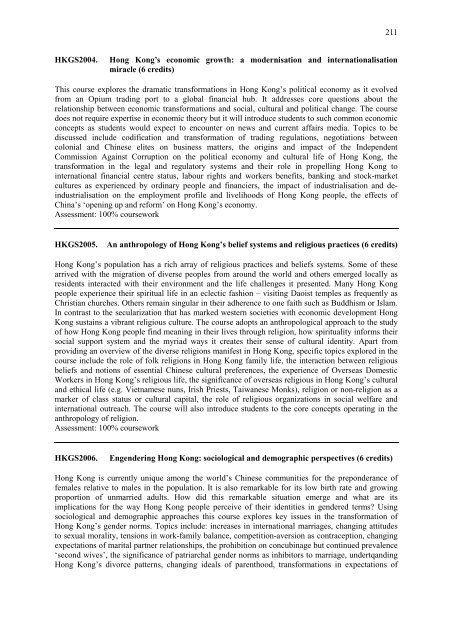(BA) (4-year-programme) - The University of Hong Kong
(BA) (4-year-programme) - The University of Hong Kong
(BA) (4-year-programme) - The University of Hong Kong
Create successful ePaper yourself
Turn your PDF publications into a flip-book with our unique Google optimized e-Paper software.
211HKGS2004.<strong>Hong</strong> <strong>Kong</strong>’s economic growth: a modernisation and internationalisationmiracle (6 credits)This course explores the dramatic transformations in <strong>Hong</strong> <strong>Kong</strong>’s political economy as it evolvedfrom an Opium trading port to a global financial hub. It addresses core questions about therelationship between economic transformations and social, cultural and political change. <strong>The</strong> coursedoes not require expertise in economic theory but it will introduce students to such common economicconcepts as students would expect to encounter on news and current affairs media. Topics to bediscussed include codification and transformation <strong>of</strong> trading regulations, negotiations betweencolonial and Chinese elites on business matters, the origins and impact <strong>of</strong> the IndependentCommission Against Corruption on the political economy and cultural life <strong>of</strong> <strong>Hong</strong> <strong>Kong</strong>, thetransformation in the legal and regulatory systems and their role in propelling <strong>Hong</strong> <strong>Kong</strong> tointernational financial centre status, labour rights and workers benefits, banking and stock-marketcultures as experienced by ordinary people and financiers, the impact <strong>of</strong> industrialisation and deindustrialisationon the employment pr<strong>of</strong>ile and livelihoods <strong>of</strong> <strong>Hong</strong> <strong>Kong</strong> people, the effects <strong>of</strong>China’s ‘opening up and reform’ on <strong>Hong</strong> <strong>Kong</strong>’s economy.Assessment: 100% courseworkHKGS2005.An anthropology <strong>of</strong> <strong>Hong</strong> <strong>Kong</strong>’s belief systems and religious practices (6 credits)<strong>Hong</strong> <strong>Kong</strong>’s population has a rich array <strong>of</strong> religious practices and beliefs systems. Some <strong>of</strong> thesearrived with the migration <strong>of</strong> diverse peoples from around the world and others emerged locally asresidents interacted with their environment and the life challenges it presented. Many <strong>Hong</strong> <strong>Kong</strong>people experience their spiritual life in an eclectic fashion – visiting Daoist temples as frequently asChristian churches. Others remain singular in their adherence to one faith such as Buddhism or Islam.In contrast to the secularization that has marked western societies with economic development <strong>Hong</strong><strong>Kong</strong> sustains a vibrant religious culture. <strong>The</strong> course adopts an anthropological approach to the study<strong>of</strong> how <strong>Hong</strong> <strong>Kong</strong> people find meaning in their lives through religion, how spirituality informs theirsocial support system and the myriad ways it creates their sense <strong>of</strong> cultural identity. Apart fromproviding an overview <strong>of</strong> the diverse religions manifest in <strong>Hong</strong> <strong>Kong</strong>, specific topics explored in thecourse include the role <strong>of</strong> folk religions in <strong>Hong</strong> <strong>Kong</strong> family life, the interaction between religiousbeliefs and notions <strong>of</strong> essential Chinese cultural preferences, the experience <strong>of</strong> Overseas DomesticWorkers in <strong>Hong</strong> <strong>Kong</strong>’s religious life, the significance <strong>of</strong> overseas religious in <strong>Hong</strong> <strong>Kong</strong>’s culturaland ethical life (e.g. Vietnamese nuns, Irish Priests, Taiwanese Monks), religion or non-religion as amarker <strong>of</strong> class status or cultural capital, the role <strong>of</strong> religious organizations in social welfare andinternational outreach. <strong>The</strong> course will also introduce students to the core concepts operating in theanthropology <strong>of</strong> religion.Assessment: 100% courseworkHKGS2006.Engendering <strong>Hong</strong> <strong>Kong</strong>: sociological and demographic perspectives (6 credits)<strong>Hong</strong> <strong>Kong</strong> is currently unique among the world’s Chinese communities for the preponderance <strong>of</strong>females relative to males in the population. It is also remarkable for its low birth rate and growingproportion <strong>of</strong> unmarried adults. How did this remarkable situation emerge and what are itsimplications for the way <strong>Hong</strong> <strong>Kong</strong> people perceive <strong>of</strong> their identities in gendered terms? Usingsociological and demographic approaches this course explores key issues in the transformation <strong>of</strong><strong>Hong</strong> <strong>Kong</strong>’s gender norms. Topics include: increases in international marriages, changing attitudesto sexual morality, tensions in work-family balance, competition-aversion as contraception, changingexpectations <strong>of</strong> marital partner relationships, the prohibition on concubinage but continued prevalence‘second wives’, the significance <strong>of</strong> patriarchal gender norms as inhibitors to marriage, undertqanding<strong>Hong</strong> <strong>Kong</strong>’s divorce patterns, changing ideals <strong>of</strong> parenthood, transformations in expectations <strong>of</strong>
















